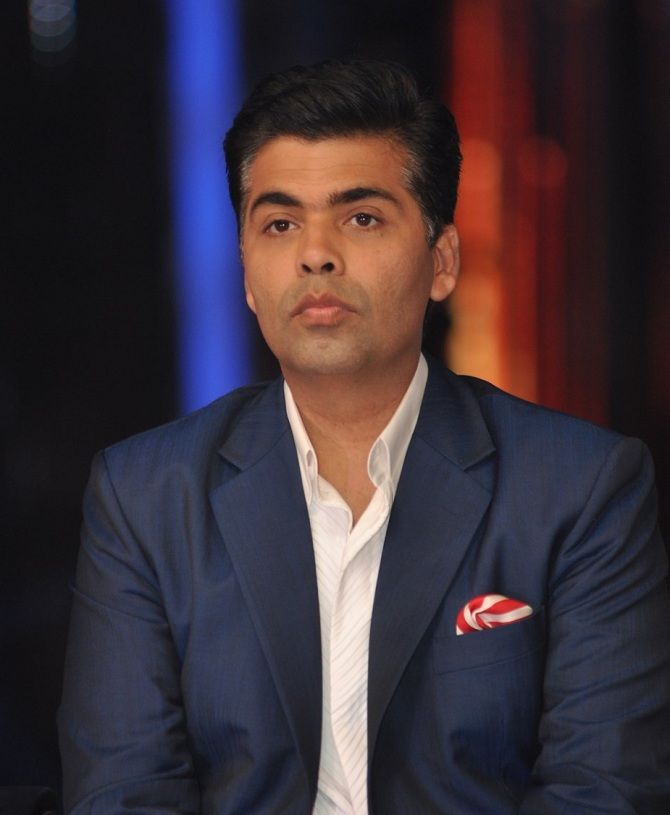'The inability to have children with the person you love is a foundational shock of being gay,' says Vikram Johri. 'Karan Johar's becoming a parent through surrogacy focuses attention on exactly the demographic that India's divisive Surrogacy Regulation Bill targets.'

With his remarkable ability to remain in the news, Karan Johar has fashioned a powerful personal brand that is, for the most part, celebrated in the media and among the chattering classes.
Recently, he added another feather to his brimming cap by announcing that he had become a father to two children via surrogacy. While such events cannot be planned, some saw the timing of the announcement as portentous, acting as a reminder to the government to return its divisive Surrogacy Regulation Bill to the limelight.
The Bill, which had come to the national centre stage last year due to its strident advocacy by Sushma Swaraj, got lost in the melee of demonetisation. Johar's news may wake this government anew.
Together with the release of his new book, in which he outed himself as gay without, in a style only he can carry off, saying it in as many words, Johar's becoming a parent focuses attention on exactly the demographic that the proposed Bill targets.
Only heterosexual couples who cannot bear children will be allowed to opt for altruistic surrogacy, the kind where no money changes hands. Men like Johar will be placed firmly beyond the pale, a possibility that may have forced his hand to opt for surrogacy at this time.
Everyone agrees that surrogacy needs to be regulated. There is too much money riding on it -- a 2012 CII study pegged the market at $2 billion, a number that would have substantially increased in the interim.
Social activists have rightly spoken about the rights of the surrogate, a group comprising mostly poor women who rent their wombs to meet urgent financial needs. There is much scope for exploitation is such a setup and regulation can ensure that things remain above board.
But to ban all commercial surrogacy and to restrict surrogacy to a small class of individuals is to take things too far.
Some in the government have tried painting the Bill as an attempt to get more Indians to adopt. While that is a laudable goal, the government's move smacks of the kind of mai-baap mentality that it had promised it would refrain from. Why should the government decide what sort of family one wants to raise?

Worse, the government's move to ban single men and women from surrogacy will eliminate a large group, including LGBT persons, from raising children who are related to them by blood.
In India, any debate involving LGBT rights is immediately branded elitist, given we are a country still reeling from crushing poverty. But the Bill, and its intent, raise vital questions related not just to the frequently debated rubric of human rights, but also to another, less legally enforceable idea: empathy.
If the government took a less dim view of homosexuality, it would realise that enforcing moral codes on a beleaguered minority will further marginalise a community that already suffers the consequences of its irrevocable condition.
Remember that the surrogacy Bill was first introduced in the aftermath of Tusshar Kapoor announcing that he had become a parent via surrogacy. To imagine the government's move in this regard as a reactionary blowback against what it conceives as immorality run amok is not far-fetched.
It is customary, but also somewhat facile, to condescend to these concerns, to portray them as orthodox, worries drowning in the fear of an unknown moral universe.
Indeed, the modern gay rights movement has plumbed the other extreme, presenting gayness as something special and worth celebrating.
Between these two views stands a seemingly unconquerable chasm, as public debate in India around surrogacy has shown.
Empathy, from both sides, can issue light.
It is a manifest fallacy, albeit one with compassionate roots, that gayness is special. Anything that involves constant negotiation and vast silence cannot be, and gay persons will be the first to tell you the execrable toll their sexuality takes on them.
I often wonder if perhaps religions decreed homosexuality as sinful not for nebulous moral reasons but to send out a cautionary message about its capacity for inducing mind-shifting trauma.
What LGBT persons can work with is kindness -- not disdain or celebration. Allowing them to raise families will make a world of difference to their psychological state. The inability to have children with the person you love is a foundational shock of being gay.
Whether and when LGBT persons in India will be able to have partners is a matter stuck in the courts. Meanwhile, the government can let them grasp at straws by permitting them the joys of parenthood.












 © 2025
© 2025